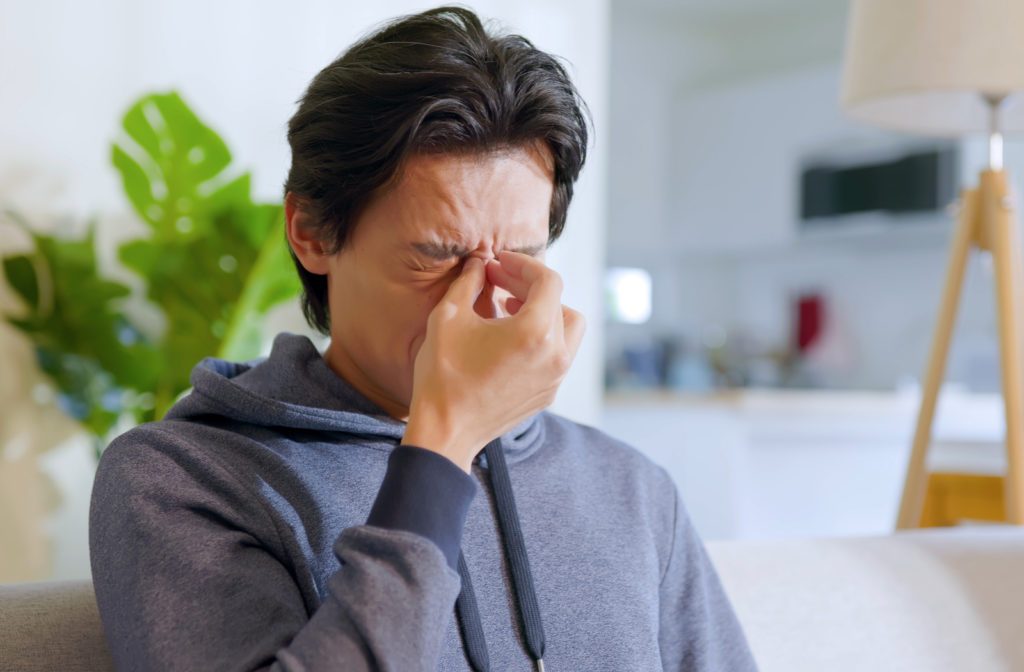If you’re one of the millions of Canadians struggling with dry eye’s irritating symptoms, you likely know the effect it can have on your eye comfort and vision.
However, if you’re starting to develop dry eye or know someone who might be, it’s important to know how this condition can affect your vision quality over time. But there’s no need to worry; Queensway Optometric is here to help you maintain your eye comfort and preserve your vision through personalized strategies and techniques.
Today, we’re going to look at how dry eye syndrome could lead to blurry vision, how it could cause permanent vision loss, and what you can do to protect your eyes.
Through modern technologies and our commitment to serving your family’s vision, we can help you and your loved ones see the world in a whole new way. Redefine your understanding of family eye care and book your appointment today!
Dry Eye Can Cause Blurry Vision, But How?
Let’s dive right in: Yes, dry eye can cause blurry vision.
However, before we go over how dry eye can affect your vision, it’s important to understand the relationship between your eye comfort and your tears.
Your eyes are covered by the tear film, a thin layer of tears responsible for keeping your eyes hydrated, protected, and comfortable. The tear film uses 3 ingredients (mucin, water, and oil) to perform its job, but various conditions can affect the stability of its ingredients, specifically water and oil.
There are two common types of dry eye: aqueous tear deficiency (AQT) and evaporative dry eye (EDE). AQT occurs when your tear film lacks the water content it needs to hydrate and protect your eyes from dust and small particles, while EDE occurs when your tear film doesn’t have enough oils to seal in the rest of your tear film and prevent it from evaporating.
Regardless of what type of dry eye you have, you may experience several uncomfortable and irritating symptoms. Some issues that may cause blurry vision include:
Wateriness
Wateriness is a common dry eye symptom and can cause blurry vision until you find relief.
Wateriness can occur if your tears evaporate too quickly, causing certain glands in your eyes to produce more water to maintain your eye comfort. However, it may also occur if something is irritating your eye, like an allergy or a small particle.

Eye Strain
A common eye condition that many people experience is eye strain. Although it may not mean you have dry eye, eye strain can still cause several dry eye symptoms like redness, wateriness, irritation, and, of course, blurry vision.
Eye strain typically occurs when you spend a lot of time doing a visually demanding task like reading, writing, or driving. Because you’re spending so much time looking at something up close, you might start to blink less than you normally would. As a result, your tear film may evaporate, causing dry eye symptoms and blurry vision.
Contact Lenses
Contact lenses are fantastic for helping us achieve crisp vision without worrying about bringing our eyeglasses everywhere we go. However, wearing and caring for your contact lenses properly ensures your vision is comfortable and clear.
Poor care of your contact lenses can increase the risk of eye infections and corneal damage over time. In some cases, contact lenses have been known to contribute to meibomian gland dysfunction, a leading cause of EDE.
If your contacts are dirty, it may affect your eye comfort and lead to blurry vision. Please speak to one of our experts today if you need help cleaning your contact lenses!
Dehydration
Yes, even being dehydrated can cause dry eye blurry vision.
Not only can dehydration decrease tear production and affect your eye comfort, it can also increase the risk of experiencing headaches and migraines that may affect your vision quality. You could help manage your risk by staying hydrated, especially if you’re playing sports or other high-energy activities.
On average, we recommend drinking about 6 to 8 glasses of water a day.
Health Conditions
Several different health conditions can increase the risk of both AQT and EDE, subsequently contributing to blurry vision. Health conditions commonly associated with dry eye include:
- Sjogren’s syndrome
- Lupus
- Rheumatoid arthritis
- Thyroid deficiencies
- Vitamin A deficiency
- Allergies
Should You Be Concerned?
Dry eye is a common issue, and numerous strategies are available to help manage its symptoms and provide relief. Even if you experience blurry vision, visiting your eye doctor regularly and following their instructions is a great way to ensure your vision stays crisp and comfortable.
However, if you don’t get help with your dry eye symptoms, it may become more severe over time. Your tear film provides vital protection from bacteria and particles that could cause corneal damage and eye infections.
Corneal Damage
The cornea is the clear, dome-shaped area of the eye that covers your iris and pupil. Think of it as the window light passes through to reach your retina.
If your dry eye symptoms become severe enough, your tear film may not be able to wash away particles that could land on your cornea. Without the tear film, these particles like dust and dirt can damage your cornea and cause scarring that could permanently affect your vision.
If you experience corneal damage like this, we may recommend surgical options like a corneal transplant or PTK surgery to help restore your vision.
Eye Infections
You can develop an eye infection even if you don’t have dry eye, but a compromised tear film could increase your risk.
Some of the most common eye infections you may risk developing when you have dry eye could include:
- Conjunctivitis (pink eye)
- Keratitis
- Blepharitis
- Styes
Following your dry eye treatment can help protect your eyes from infections, but you could also lower your risk by:
- Washing your hands regularly.
- Using clean towels and cloths on your face.
- Not sharing eye makeup or hygiene products.
- Cleaning your contacts regularly.
- Washing your bed sheets and pillowcases regularly.
How To Protect Your Vision
Whether your symptoms are minor or severe, we believe you deserve healthy, comfortable vision. And getting the help you need as early as possible can help protect your sight from potential complications related to dry eye.
Here are just a few ways you can help manage your symptoms and keep your eyes comfortable:
Have Regular Eye Exams
No matter what issue you might be experiencing with your eyes, the first step to getting the help you need is ensuring you have regular eye exams.
Visiting our team regularly for routine exams helps look for potential issues before they lead to more serious symptoms, including dry eye. By detecting these problems early, we can provide you with personalized strategies that fit your eye health and lifestyle.
Follow Our Doctor’s Advice
Whether we’re addressing dry eye or managing potential eye diseases, following our doctor’s treatments and recommendations is key to keeping your eyes healthy and your vision clear.
Even if your eyes start to feel better, we recommend keeping up with our doctor’s advice and recommendations until they suggest otherwise.
Adjust Your Lifestyle to Support Your Eye Comfort
Adjustments to your lifestyle or home is another great way to help keep your eyes hydrated and comfortable, even when following a dry eye treatment plan. Some adjustments we may recommend include:
- Adding a humidifier to your workspace or home.
- Taking regular breaks while working on upclose tasks.
- Wearing glasses or other types of eyewear to protect your eyes from wind.
- Avoid wind, smoke, and dirty areas whenever possible.
Speak to Us Today
Our team at Queensway Optometric understands just how important your family’s eye comfort and vision is, so we’re happy to address any concerns you may have when you come in for an appointment.
Whether you’re struggling with dry eye, or need a new lens prescription, we’re always ready to help. Book your next appointment today!


